 Cultivating truth, goodness, and beauty grounded in the Christian worldview
Cultivating truth, goodness, and beauty grounded in the Christian worldview Cultivating truth, goodness, and beauty grounded in the Christian worldview
Cultivating truth, goodness, and beauty grounded in the Christian worldview
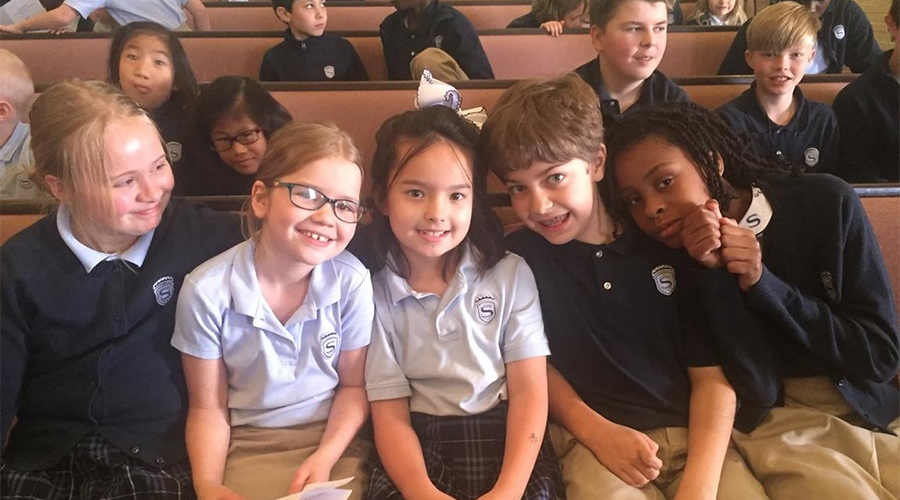
"May the wind under your wings bear you where the sun sails and the moon walks." No one says goodbye more eloquently than Gandalf. The great wizard says these words in The Hobbit to a flock of "strong and noble-hearted" eagles that have just saved Bilbo and friends from a dreadful goblin attack.
The scene comes in the middle of Tolkien's great fantasy novel and marks a transition from one great adventure to another: From the "frying-pan" to the dark forest of Mirkwood. Our graduating seniors have also found themselves at one of the great transitions of their adventurous life. Each adventure in Bilbo's journey is helping shape his character and behavior for future challenges. Similarly, Stonehaven's vision is to prepare our children spiritually to face the inevitable challenges of life (2 Timothy 4:1-5).
In The Fellowship of the Rings, Frodo recalls Bilbo once saying, 'It's a dangerous business, Frodo, going out of your door... 'You step into the Road, and if you don't keep your feet, there is no telling where you might be swept off to." To our Stonehaven seniors, there is no telling where you might be swept off to as you leave the doors of your home and your school. It certainly is a "dangerous business" as Biblo warns, but it is also full of immeasurable wonder and inestimable joy. Go forth boldly for the Lord is with you. Trust that He will be "the wind under your wings" as you journey to places where "the sun sails and the moon walks." And may you never forget that the doors of our school are always open to you. Peace be with you.
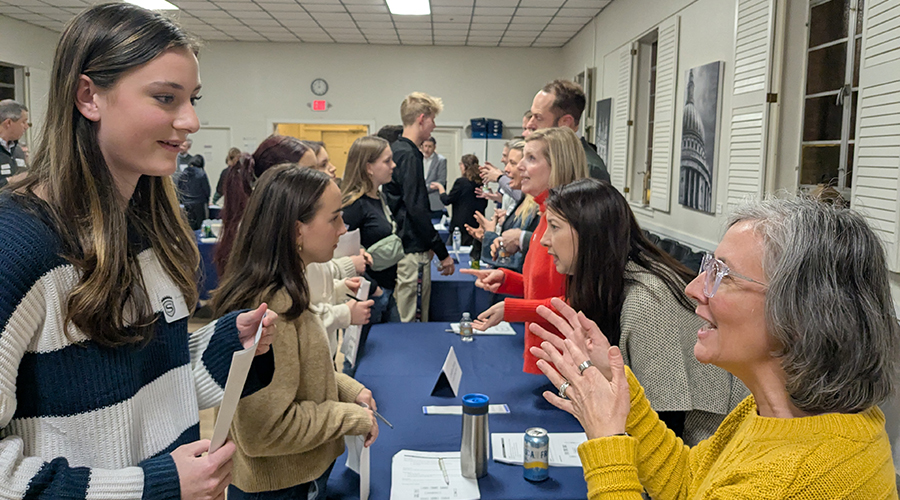
In a few weeks, I will do one final Stonehaven handshake with our Senior graduates. It feels very appropriate that we will send them off in the same way we welcomed them on their first day to the school: Attentive eyes, a kind smile and a firm handshake.
The philosophical approach of Stonehaven's rhetoric school has a very intentional focus on training our students the art of communication. In relation to this, we will often discuss our desire that they can discuss the great ideas of literature, theology, and history. And although this is a significant part of a Stonehaven education, we also want to train our children in the more simple and mundane forms of communication. Can they engage in a meaningful conversation with an adult? Are they capable of asking good questions? How are we training them to be attentive listeners? Are we graduating students prepared to respectfully challenge their professor in their Philosophy 101 class at the University of Georgia?
One of the great pleasures of the past five years, with the launch of our Upper School, has been to see the impressive growth in the communication skills of our Rhetoric students. Our parents witnessed this in a special way at our January Calling event where our 9th-12th graders were expected to approach three parents and engage in a thoughtful conversation with each of them about what they do professionally. The goal was more than having our students learn about the vocations of our parents. We expected them to greet the adult appropriately, ask meaningful questions, and demonstrate sincere interest through their words and body language. The parents that attended agreed it was truly impressive to see our children exhibiting so effectively these skills they are learning at school and in their homes. Although we have a particular emphasis on communication in our Upper School, it is beautiful to see how we have been cultivating these skills from their very first day of Kindergarten... "Good morning Mr. Edwards!"
Article Link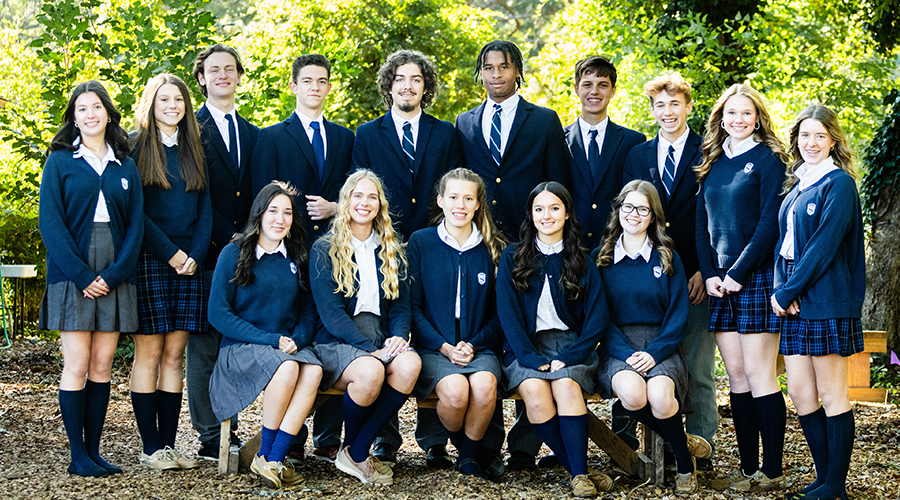
How do we measure success for our school? Standardized test scores? Enrollment numbers? Elite college acceptances? In every admissions family interview, we ask parents to imagine the day when their child is standing on a high school graduation stage... "What are your hopes and aspirations for your child on that day?" We ask this question because we know that the cultivation of Godly Christian character is our ultimate goal as parents. In God's good and ironic providence, the first admissions family interview in which I participated was in the spring of 2012... with Tony and Hannah Miley. In a few weeks, this once-imagined exercise becomes very real when their daughter Raegan walks across the class of 2025 graduation stage.
Two recent school activities prompted me to consider the success of a Stonehaven education. The first is the impressive achievements of our boys and girls tennis teams. This past Tuesday, our girls team finished second in the state tournament and our boys team won the school's first ever athletic state championship. The second activity was the completion of the Senior Capstone projects from our graduating class. Many of the virtues exhibited during these activities were not surprising; diligence, commitment, excellence, and perseverance. But, what was most affirming was to see them leading and serving with "humility, gratitude, and grace."
There are different ways in which athletes win championships. There are different ways in which a student demonstrates knowledge. It was refreshing to see our students performing these activities in a Christ-honoring way that fulfills the aspirations of their parents from so many years ago.
When we are looking to measure our success, let us look to our portrait of a graduate...
Stonehaven aims to graduate young men and women who:
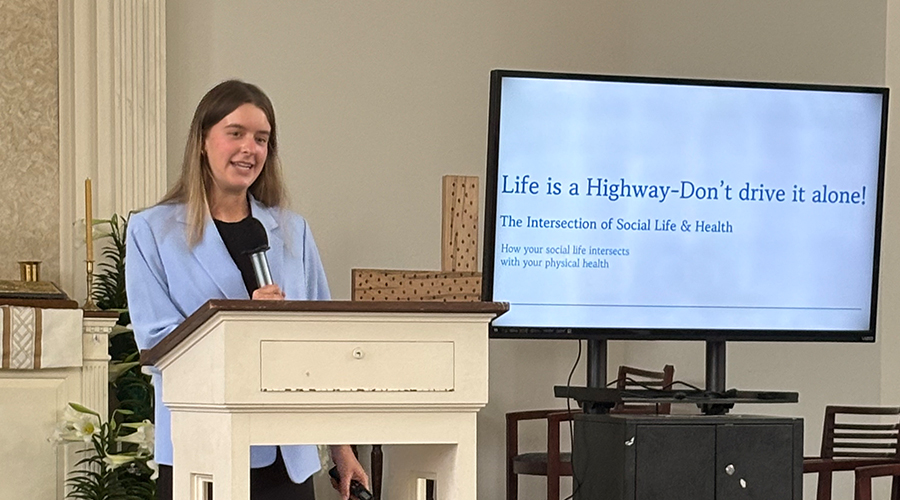
Paul McCartney famously said he woke up with the melody of "Yesterday" fully formed in his head. At first, he was convinced he must have heard it somewhere before. He even asked around, "Have you heard this?" before accepting it was original. I can relate, because Stonehaven's Senior Capstone feels so familiar I sometimes wonder if we borrowed it from somewhere. Public, private, charter, classical, and homeschool models have all moved toward a capstone for seniors, but ours seems wholly original. #keepstonehavenweird
Stonehaven's Senior Capstone is a season of three unique but related assignments that bring all available tools of persuasion to grapple with value, morality, and logic. Each assignment nods to Plato's tripartite soul described in The Republic.
The first assignment, the Epistle, mirrors the senior thesis model at many schools. Seniors choose a topic and, with a committee's help, refine a problem for proper academic treatment. This phase appeals to Plato's logistikon-the head-since strong sources, clear reasoning, and persuasive writing are critical.
The next assignment is the Senior Capstone Symposium, where seniors share research summaries, personal connections to their topics, and calls to action. This assignment taps into thymoeides-the heart-due to its strong pathos appeal.
The final assignment is the Exhibitio. This Thursday from 4-5:30 p.m., seniors will display or perform artifacts they've created or curated, appealing to epithymetikon-the appetite. Some galleries are interactive; others are performances. We cannot wait to share something truly unique to Stonehaven yet deeply rooted in the classical tradition.
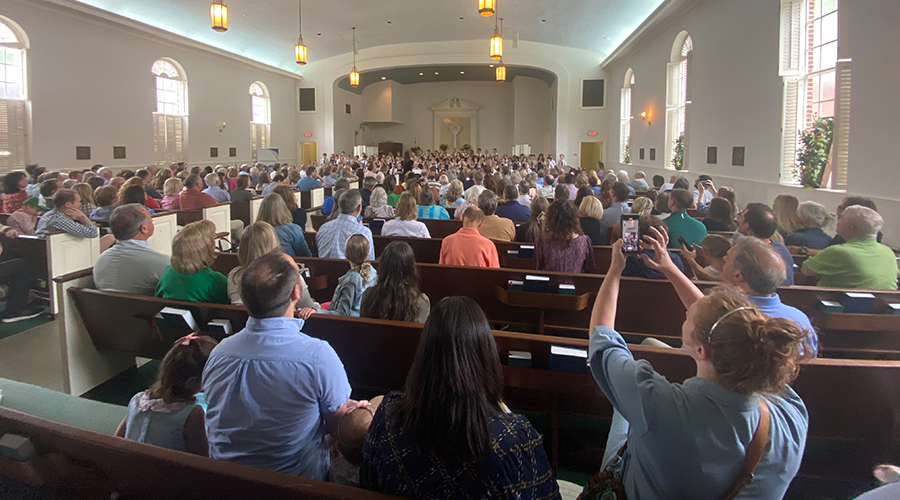
Why Grandparents Day?
Do you remember your first time visiting Stonehaven? Several times a week, Mrs. Miley shows interested families around Stonehaven and inevitably, the question "what is classical education" comes up. She reviews the distinctives of a classical Stonehaven education, answers their questions, and then at a certain point, says, "Let's go visit some classrooms, so you can see." Depending on their children's ages, it might be a visit to the sweet kindergarteners ready to share a poem or Scripture passage they have memorized. All the way down the hall, they might hear budding musicians practicing their instruments or singing a new song that Mrs. Johnson is teaching them. They might go upstairs to the 6th graders who are actively engaged in discussion with Mr. Mastrianna about medieval philosophical ideas. (Did you consider this topic at all when you were 12? I did not!) At the Upper School, they might see students working out Logic concepts, speaking in a full Latin conversation, working through Pre-calculus problems or spending a break outside playing basketball. In each of these settings, visitors have the chance to observe truth, goodness, and beauty happening on our campus.
Grandparents, Friends, and Family Day is an invitation to our entire community to "come see!" We love hosting treasured family members and friends to campus to be able to show them a sampling of student life at Stonehaven. Perhaps even more so, we love seeing the delight in our students' faces as they welcome Nana or Pop or Aunt Sarah or their favorite neighbor to their classroom and introduce them to their teachers and friends. We're looking forward to opening our doors on Friday, May 2nd to share the uniqueness of Stonehaven.
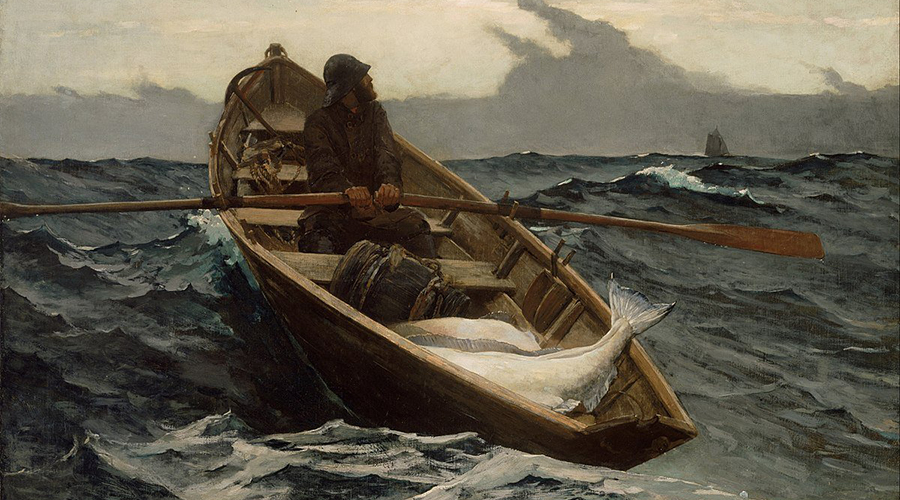
Classical Christian?! What is that?
"Are you a teacher? With all those tattoos?" This is the primary question I receive while conversing with people when I'm out and about. The second most frequently asked question usually follows as a statement: "Classical. What is a classical Christian school?" While Knightly News may not be the venue for a discussion on ink, it serves as a forum to address the latter.
Irenaeus, a revered church father, beautifully stated, "For the glory of God is the living man, and the life of man is the vision of God." This inspiring declaration has had a profound impact on my journey as a Christian classical educator. To me, it wonderfully captures the essence of our educational approach, which is twofold. On one side, it highlights the joy of reflecting God's character and His marvelous redemptive purposes through Christ, ultimately bringing glory to Him. This is why we cherish the first answer from the Westminster Shorter Catechism: "Man's chief end is to glorify God and enjoy Him forever." On the other side, it embraces the beautiful biblical concept of Imago Dei, reminding us that humanity is created in God's image. Recognizing this identity is essential for true human flourishing. As a Humanities teacher, I find great joy in emphasizing the rich connections between Anthropology, the study of human beings, and Theology, the exploration of God's nature and character. John Calvin captures the essence of Christian classical education so well in the opening of The Institutes of the Christian Religion: "Nearly all the wisdom we possess, that is to say, true and sound wisdom, consists of two parts: the knowledge of God and ourselves."
While progressive education, found in many public and private secular schools, may not always bring glory to God or enrich students' lives, it can sometimes contribute to a sense of separation from Him amid our human struggles. Instead of nurturing vibrant and thoughtful individuals, it might lead students toward confusion and despair (Rom. 1:21). In contrast, Christian classical education offers a beautiful opportunity to embrace a well-rounded understanding of both God and ourselves. Having stood the test of time and faith, it beautifully embodies Irenaeus' mission to glorify God while nurturing a rich and fulfilling life for students.
This vision for education embraces the wonderful qualities of what is ethically good, philosophically and theologically true, and beautifully aesthetic. By nurturing a sense of wonder and a passion for learning, we enhance the love for knowledge within the classroom. This approach inspires students whose greatest desire is to honor God, recognizing that a life dedicated to Him leads to true human flourishing. Ultimately, a Christian classical education gives students a distinct advantage in discovering the virtue of walking wisely "east of Eden" (Gen. 4:16).

During my high school years, I often found myself looking forward to college as the coming golden age of my life. Finally, I would be released from the draconian rules of my parents and unburdened by the "useless" academic exercises of my teachers. As I yearned for the next phase of my life, the picture that comes to mind is the painted face of William Wallace in the movie Braveheart yelling, "Freedom!" As I matured spiritually during my college years, I learned the true source of my discontentment. It was rooted in my own heart. I struggled to see and appreciate God's abundant blessings in the present. The solution to my discontentment was not a change in circumstances but rather a change in heart.
At our Soiree event this past Friday, I reminded our community of one of our Stonehaven call outs: Enough is as good as a feast. We are soon embarking on the largest building project in our school's history. Although I am excited about our school's future, God is calling me "to give thanks in all circumstances" (1 Thessalonians 5:18). These circumstances include full classes and overcrowded carpool lines. We can both look forward to our future and fully enjoy the feast of today. I wonder sometimes, "Do my children see in me a spirit always yearning for tomorrow or one taking pleasure in God's faithful provisions for today?" There will always be something more to desire... a nicer car, a bigger house, or a new shiny school building. Let us look into the eyes of our children and see afresh the lush green grass of today (2 Corinthians 9:8).

My favorite Bluey episode is Pass the Parcel. Lucky's Dad is appalled to find out that the new way of playing this classic British party game contains prizes within each layer of wrapping. He interprets this as another casualty of the "everyone's a winner" sentiment. He decides to put a stop to it, "No way, I want to play it the proper way... I'm putting my foot down Janelle - we're raising a nation of squibs." The "nation of squibs" line has become a new favorite in the Edwards home. Lucky's Dad takes charge at the next birthday party by reverting to the original rules where there is only one "winner." He is surprised to learn that the puppies are not pleased with Lucky's Dad's new rules. Overwhelmed by the emotional response, Lucky's Dad rushes to each of the puppies offering them five dollar bills to stop their crying.
One of the most important lessons our children will learn in life is the resilience that can be nurtured and learned from losing. How to respond to the failures and setbacks that will inevitably come their way is an vital part of growing up. Inspired by Lucky's Dad, the Edwards introduced Pass the Parcel to our children at a birthday gathering this past Saturday. Our two year old Henry thoroughly enjoyed the game until the very end. "Wait a second, she gets that toy... that doesn't seem fair... what about me!?" He approached me several times during the festivities exclaiming, "But I want a present too!" From Pass the Parcel to losing a tennis match, from misspelling a word in the first round of the Spelling Bee to not being accepted to one's first-choice college; losing is something our children should expect in their future.
Resilience. It is a word we want to define our children when they are grown up and leaving our homes. It is, "the capacity to withstand or to recover quickly from difficulties; toughness." How weather impacts the root system of trees seems to be a particularly helpful analogy for how we nurture resilient children. Wind and storms can have both a positive and negative impact on trees. If strong enough, wind will bring a tree to the ground. But, the more common result of wind is the strengthening of the tree's root system. The roots will actually grow deeper and stronger in windy environments. The more storms a tree withstands, the stronger it will be. What is the obvious implication for our work as parents and teachers? Our children need to be exposed to wind to develop resilience. We should not be seeking to protect our children from the winds of this world. We should actually seek to place them in environments where they will face the winds that will make them stronger. Some windy environments include a drama stage, a basketball court, or a chess competition.
I have had the pleasure of coaching the middle school boys soccer team this year. In our second game, we were tied at the end of regulation. This brought the game down to penalty kicks where each team chooses five players to take a single shot on goal. This is one of the more stressful situations in all of sports. All the players and fans quietly watch each player as they take a single shot on goal. If successful, the player feels like a million dollars. If the player, they are usually overwhelmed with disappointment and sadness. It can bring the strongest of men to tears. Unfortunately, we lost this game and it was especially difficult for those that didn't score on their penalty kick. Two weeks later, we once again found ourselves tied at the end of the game. However, in this situation we ended up winning the game by successfully scoring on the first four penalty kicks. Two of the athletes that scored goals in this game had missed their shots in the previous game. Had the "winds" of the previous game given them stronger roots for this situation? The experience from the previous game certainly helped prepare these boys for the stress of this situation.
When our children encounter the obstacles of life, do we communicate to our children the positive or negative aspects of the challenge? Paul comforts the Christian saying, "And we know that for those who love God all things work together for good, for those who are called according to his purpose" (Romans 8:28). The story of Joseph is the first that comes to mind when I see how the Lord can use great trials for good (Genesis 50:20). Let us remind our children that we can learn much from losing as it truly is one of life's greatest teachers.
In the Bluey episode, the puppy Bingo initially struggles when she isn't "winning" the Pass the Parcel game. Multiple parties and somehow Bingo is always on the outside looking in. At one point, Bingo's mother Chilli empathizes with daughter's bad luck. Bingo graciously responds that she is happy to see her friends win and concludes saying, "Maybe next time." Impressed, Chilli says, "You know what, Bingo? I think you're getting quite good at losing." Makes me think of Stonehaven's beloved St. Andrews house and how they have learned to lose well. They have never lost their joy and camaraderie while maintaining their aspirations of victory. For if we keep at it, it is only so long before the music stops at just the right time and we might enjoy a much sweeter victory than the one that hasn't experienced defeat.
Article Link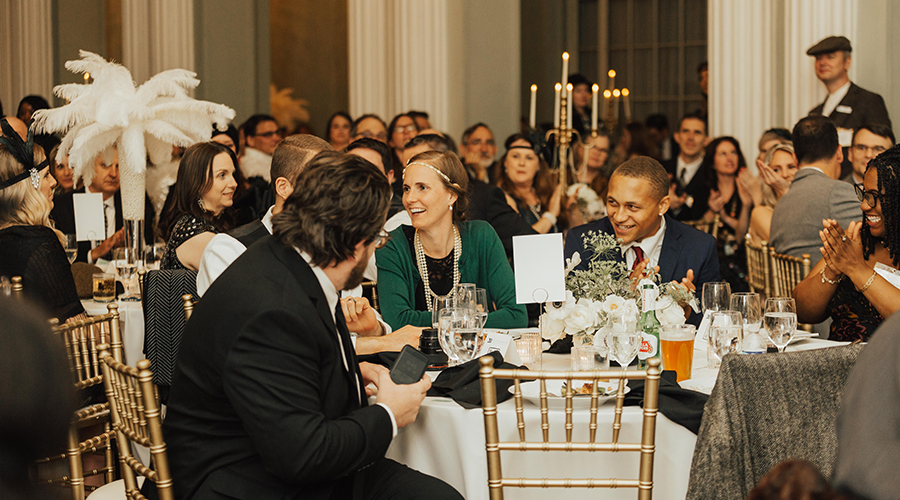
You can learn much about a culture or a community by observing how they celebrate. My favorite party, albeit fictional, comes from the vibrant description of Bilbo's "Farewell Party" in J.R.R. Tolkien's book The Fellowship of the Ring. It is Bilbo's 111th birthday which coincides with his nephew Frodo's 33rd birthday. The event is a "party of special significance" and the festivities included magical fireworks, a lavish feast, and wagons full of gifts. Tolkien's vivid account depicts an occasion full of mirth, joy, and delight. In addition, the party includes one of my favorite lines of literature when Bilbo tells all those in attendance, "I don't know half of you half as well as I should like; and I like less than half of you half as well as you deserve."
One of the important ideas we need to teach and train in our children is a Christian way of celebrating. For we do not celebrate like the world does; The world celebrates with no eternal hope. We celebrate as an expression of the overflow of gratitude for God's everlasting mercy, grace, and provision. As John Piper says, "God is most glorified in us when we are most satisfied in Him." Many of my favorite Stonehaven memories come from times of communal celebration. One of the most obvious events on our school calendar is the annual Soirée where we come together to rejoice in the Lord's blessings to our school. Please come and join us on Friday, March 28th as we celebrate God's goodness to our school.
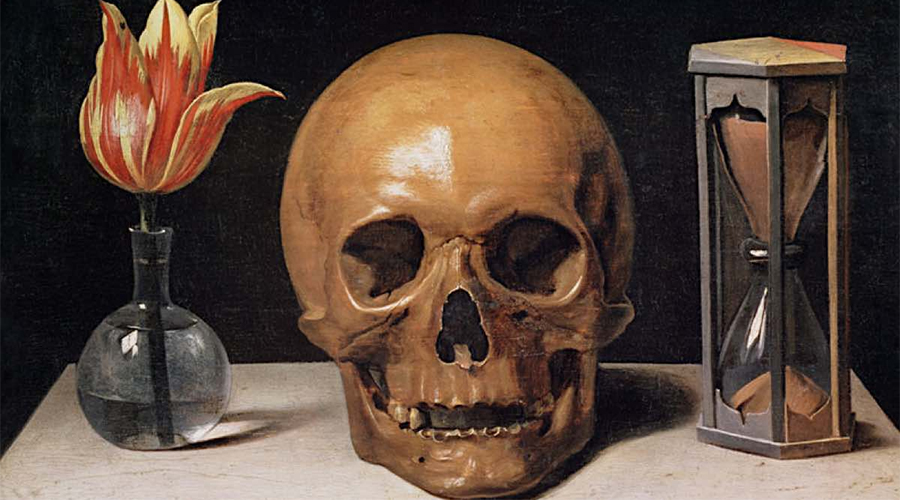
Historians tell us that a victorious Roman general, processing in triumph after his great victories, would be followed by a slave who would repeatedly whisper to him of his mortality, of the great truth that he too would one day die. A particular interest of the ancient Stoics, the idea of memento mori ("remember you must die") stands in stark contrast to the spirit of our present age. As a society and as individuals, we do all we can to put off death and even avoid thinking about the subject altogether.
In the Bible, the book of Ecclesiastes exhorts us to the practice of memento mori, to remember that death comes for us all, and that "all is vanity" (Eccl 1:2). Accordingly, through the centuries Christians have taken up the practice of memento mori, particularly during this season of Lent, as a way of reflecting on our mortality. In Christian traditions that observe Ash Wednesday, ashes are placed on a person's forehead as they hear, spoken over them, "Remember, O man, that thou art dust, and to dust thou shalt return."
These words can be unsettling, even scary. But a proper understanding of memento mori can help us live our lives with purpose and clarity. And as Christians, we know something that the Stoics never did: that death is not the end, and that "our citizenship is in heaven, and from it we await a Savior, the Lord Jesus Christ" (Phil 3:20). May we at Stonehaven be a community that lives in light of the hope that death is not the end. Memento mori!
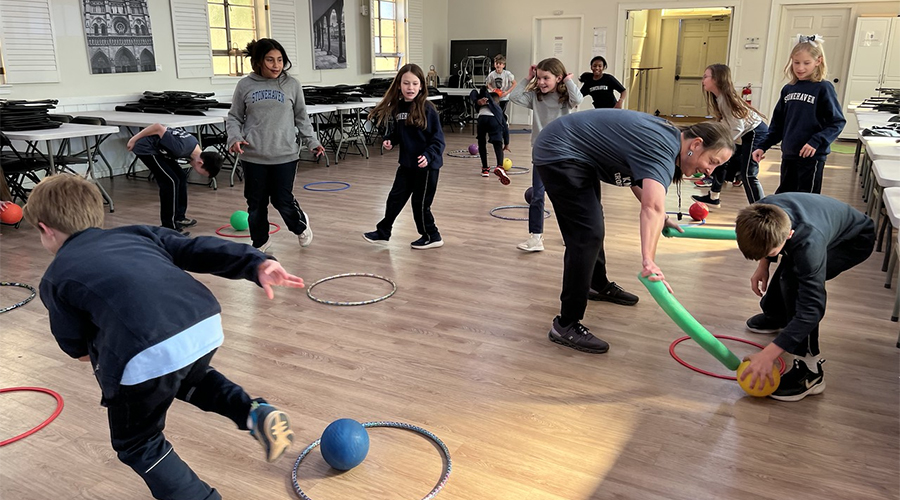
Athletics is often overlooked in discussions of classical Christian education, yet it plays a crucial role in the formation of our students. At Stonehaven, we see sports not just as competition or an extracurricular program, but as an opportunity to cultivate virtue in the pursuit of truth, goodness, and beauty. As stated in our Athletics Handbook, "the goal of Stonehaven's athletics program is not to bring glory to ourselves, nor is it to seek the praise of man. Rather, we are to pursue excellence because it reflects the very character of God."
In our lower school PE classes, Coach Cooper guides students in developing the "grammar" of athletics-building foundational skills, establishing muscle memory, and mastering basic techniques. As students mature, they apply these lessons through more frequent competition and specialized training, often joining one of Stonehaven's teams.
Athletics reminds us that God created us as integrated beings-body and soul-both requiring training and dedication to His glory. Our PE teachers and coaches help students to see that physical discipline mirrors spiritual discipline; the challenges and victories of athletic competition provide ideal opportunities to develop essential virtues such as fortitude, humility, and perseverance.
Athletics also serves as a powerful community builder, deepening bonds established in the classroom or on the playground, and serving as a vital gathering point for our community. For our athletes, participation fosters camaraderie, trust, and accountability. For spectators, athletic events provide natural gathering points that strengthen our community and show our shared commitment to the formation of the whole child. As the weather begins to turn toward spring, what better time to come out and support our athletes? Click this link to see upcoming events for our spring sports (soccer, tennis, and track).
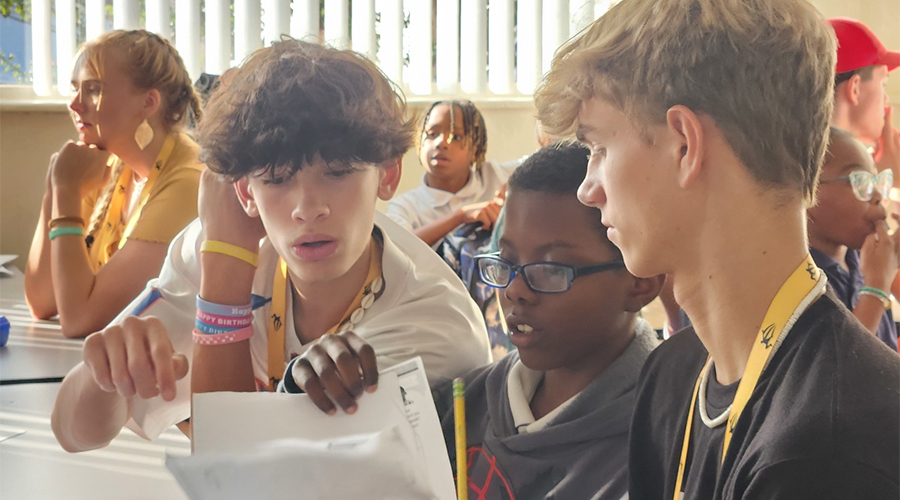
We've all been there. We are in the middle of a conversation with our spouse, a coworker, or a child. We feel the buzz or hear the chime of our phone. We pull the phone from our pocket and turn our attention away from the conversation that started well before the buzz of our phone. As I turn my eyes to the phone, I've basically turned my back on the person in front of me to see if my best buddy can go golfing tomorrow.
One of the great dangers of technology is its incredible ability to turn our attention away from the more important things. Another scenario many of us can relate to; I'm sitting in a booth at La Parrilla. I thought I was taking my wife out to dinner so I could focus my attention on her and I can't help but turn my eyes just above her head to catch the end of the Braves game! "Come on honey, it's 3-3 in the bottom of the ninth inning!"
Philosopher Simone Weil proposes that, "attention is the rarest and purest form of generosity." Writer and Stonehaven father Aaron Hanbury refers to these words from Weil in a Common Good essay about "Tech Addiction, Distraction, and Our Love-less Moment." He wrestles with our cultural moment in which "many of us appear to have a problem with attention, holding it, keeping it, getting it, giving it." Our phones and technology in general distract us from the things that truly matter. "Because not only does the incessant dinging stuff pull at me, so does the corresponding guilt of reading an email from someone who I don't know, addressed to me only by some bit of code, regarding something about which I barely care - all at the expense of the dinner that needs preparing, the woman and two children who fill up my house and comprise my home."
We are distracted. We are pulled in so many different directions. We can often justify these distractions in our pursuit to be responsive, to be accessible, and to provide security. But at what cost? Let us remember again what is most deserving of our attention. "My son, be attentive to my words; incline your ear to my sayings" (Proverbs 4:20). We are called first to love God and second to love our neighbor. Hanbury concludes his essay well, "Weil believed, more or less, that to love is to give attention, to move focus from the self to others. To another. Graciously, this recalls the source of love in the first place and is also the way of its repair."
Article Link
A few weeks ago, I was pulling into my driveway on a Saturday morning and noticed a bird perched on a nearby branch. It was not one of my normal feathered friends. I was frozen in the driver's seat marveling at the bird's strikingly barred back and its bright orange-red crown. Its movements and behavior were fascinating. I'd later confirm that I was looking at the beautiful red-bellied woodpecker. Possibly a more suitable word for what I was doing is observing.
One of the practices and habits we are committed to developing in our children at Stonehaven is that of observation. The 18th century educator Charlotte Mason said, "An observant child should be put in the way of things worth observing." This is at the heart of our Nature Studies program and our science program in general. Whether it is an oak tree, a red-bellied woodpecker, or the red fox... we want to teach and train the eyes of our children to observe and study the wonders of this world.
Observation does not come naturally to every child. I remember as a 20-year-old finding myself woefully ignorant of the basic information of the natural world. I doubt I could've distinguished a pine tree from an oak tree! I had not been trained to see and observe. Charlotte Mason says, "We all need to be trained to see and to have our eyes opened before we can take in the joy that is meant for us in this beautiful life." This is something we as parents can do at home with our children. May our children see us often observing and enjoying the wonders of God's creation (Psalm 104:24).
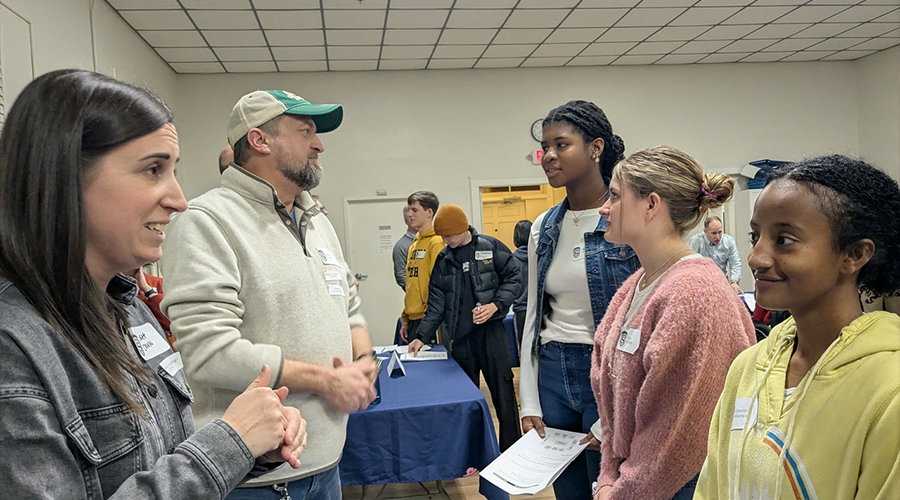
I love morning carpool. On its face, it doesn't seem like much is happening other than the simple act of students getting into the school building. But in reality, students are learning and practicing life-long needed forms and habits of interacting with others, particularly adults. At the Lower School, our students are appropriately learning the grammar of interaction. The sign placed at the front gate says it all: "Smile, Eyes, Greet." Like any habit formation, it takes time, practice and even doing it when you just don't feel like it! In fifth and sixth grade, students take on carpool responsibilities where they are the initiators of the process: opening car doors, smiling at their fellow students, and hopefully giving a "good morning!" greeting.
At our recent Cultivate guidance event, our logic and rhetoric students practiced speed interviewing parents. They were tasked with walking up to an adult, introducing themselves ("smile, eyes, greet"), and conversing about that person's vocation. It was amazing to watch our students, after some initial awkwardness, carry out this task with poise, grace, and joy. More recently, I've watched our students impressively engage with visiting university admissions officers and I've attended Student Council-led meetings for Spirit Nights, including the one that is happening this evening. During these types of events, I regularly witness our upper school students initiate conversations with adults where "smile, eyes, greet" is now second nature and carried out winsomely. This is at least partially a result of our school's mission of cultivating forms and habits that are true, good, and beautiful. And these forms and habits are developed over time, through intentional daily practices, even in the mundane act of getting into that school building. "Smile, eyes, greet." That is why I love morning carpool.
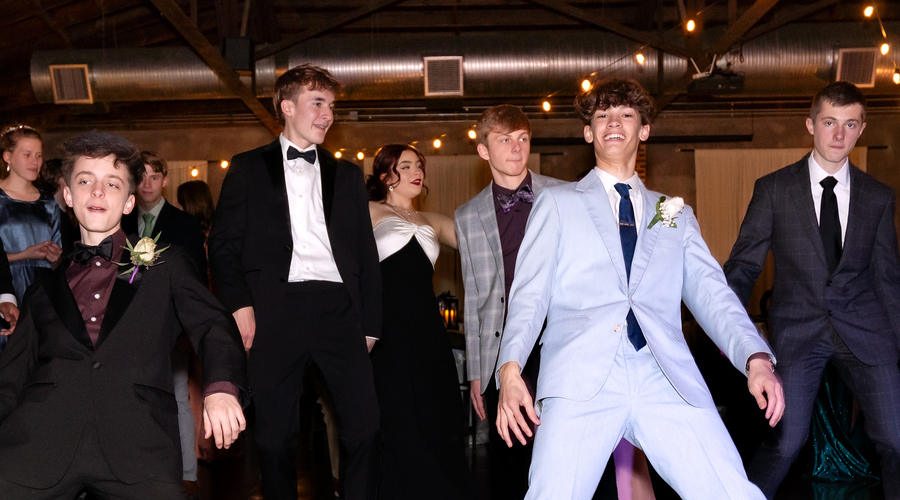
I am a worry wart. Yes. James Mastrianna. I wasn't always like this. Yes, the worry of the Dodgers blowing it in the playoffs is always present (Go Dodgers!). Still, I am talking about the gut-wrenching concern over the loss of a loved one, the struggle to provide for my family, the yearly check-up, or my children's futures.
For myself, anxiety and worry are derived from fear-the fear of man, the fear of loss, or the fear of the future. Anxiety and worry most commonly occur when we allow our minds to fixate on all possible disastrous outcomes. As fallen humans, many of us fall prey to worrying about what the future holds and whether or not we will be able to overcome it. Saint Thomas Aquinas speaks of anxiety "as the perception of some future evil approaching which one feels unable to resist or overcome (ST II-II 125:1)." At the root of fear is self-love and pride. Self-love leads us to pursue self-protection and security. Self-protection results in fear and anxiety when we conclude that we lack more than we want or when we consider all the possible outcomes of the uncertain circumstances of life. The trials of life tend to reveal unbelief and anxiety in our hearts. These are heightened by constant exposure to and analysis of natural disasters, war, and misfortunes in a media-driven culture. As believers, we must guard our minds and hearts from the external means by which the unbelieving world cultivates fear and anxiety.
When anxious about our circumstances, we try to control the various aspects of life. This may tempt us to overwork, act unjustly in financial matters, manipulate relationships, embellish our accomplishments, or be overly preoccupied with our diet, exercise, education, or savings. As believers, we sometimes dismiss sinful anxiety under carefulness or good stewardship. Jesus summarized the anxiety problem when He taught us not to worry. In Matthew 6:25-33, He said: "Do not be anxious about your life, what you will eat or what you will drink, nor about your body, what you will put on. Is not life more than food, and the body more than clothing? . . . Do not be anxious, saying, 'What shall we eat?' or 'What shall we drink?' or 'What shall we wear?' For the Gentiles seek after all these things, and your heavenly Father knows that you need them all."
We are blessed to have the truth of God's Word, which includes all His wonderful promises-Are you worried about finances? The truth is that 'my God will supply every need of yours according to his riches in glory in Christ Jesus' (Philippians 4:19). Worried that you won't have the strength to carry on? The truth is that 'I can do all things through him that strengthens me' (4:13). If you are feeling lonely, isolated, or neglected, the truth is that 'I will never leave you nor forsake you' (Heb. 13:5). Instead of worrying, let us continue as a community of believers to spend time searching the depths of His Word, and thereby renewing our minds.
Coram Deo!
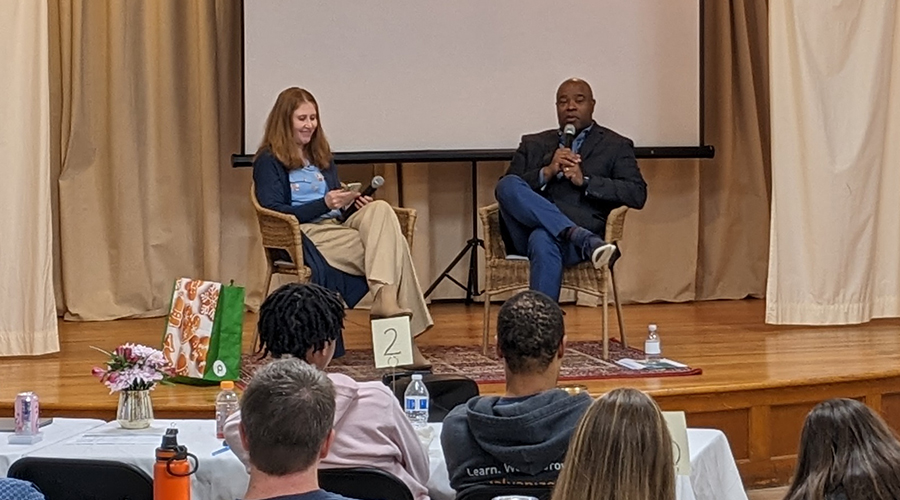
As we are about to graduate our second senior class, I can't help but reflect back to the Summer of 2020 when we were preparing to launch the first year of our high school. The details were overwhelming: curriculum, teachers, books, facilities, new traditions. As one wise parent commented to me recently - we were building the plane while we were flying it! One of the many initiatives we launched that year was our Guidance Counseling Program.
As with every initiative we have at Stonehaven, we wanted the foundation of our Guidance Counselor Program to be Biblical and support the mission and vision of our school. I, along with other staff members, began to meet with parents and students to discuss their immediate futures (what classes should they take) and dream about how their lives would look after graduation.
This is one of my favorite roles at Stonehaven. As a guidance counselor, I encourage parents with the truth of God's sovereignty ("The heart of man plans his way, but the Lord establishes his steps." Prov. 16:9). I remind students that God already knows the plans He has for them ("For we are his workmanship, created in Christ Jesus for good works, which God prepared beforehand, that we should walk in them." Ephesians 2:20). And I have the privilege of watching as God reveals his plans by closing some doors and swinging others wide open. I love it when God gives students multiple choices and then I get to encourage them with the truth that God will be with them wherever they go because they are a child of the King!
Even though we meet with parents and students multiple times in their four years of high school, we can't possibly cover all aspects of planning for their futures. For this reason, we started The Calling, an annual evening workshop for high school students and their parents. Each year we explore an aspect of God's Calling. This year's theme is Ordained Opportunities. If you are the parent of a high school student, we highly recommend you attend this year's event.
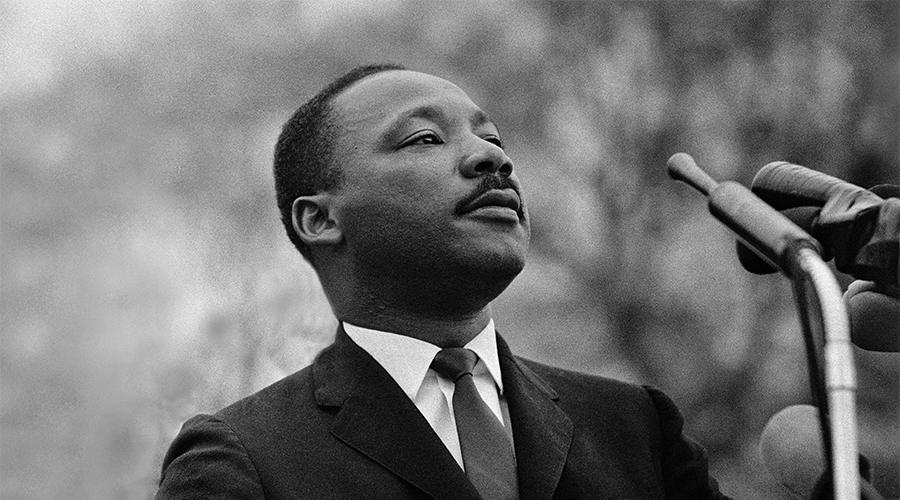
As we recognize Martin Luther King Jr. day, the Bible verse that comes to mind is from the Sermon on the Mount as Jesus challenges his followers saying, "But I say to you, Love your enemies and pray for those who persecute you." (Matthew 5:44). In reading Jonathan Eig's excellent biography King: A Life, you learn that King faced as much opposition from within his own camp as he did from outside. In other words, he had a lot of practice loving his enemies.
King's life demonstrates the power of Christian love. God does not love us because we are worthy of it. This form of love is not the result of goodness or kindness in another, its true source is the love of God working in and through us (Philippians 2:13).
In a 1957 speech, King would express these ideas saying, "When we speak of loving those who would oppose us, we speak of a love which is expressed in the Greek word agape. Agape means nothing sentimental or basically affectionate. It means understanding, creative, redeeming goodwill for all men. It is an overflowing love which seeks nothing in return. It is not set in motion by any quality or function of its object. It is purely spontaneous, unmotivated, groundless, and creative. It is the love of God operating in the human heart. When we rise to love on the agape level, we love men not because we like them, not because their attitudes and ways appeal to us, but we love them because God loves them."

On a Friday this past October, I was stopped at a red light on my way home from Stonehaven. As I waited at the intersection, a car turned into the lane opposite me. As the car slowly rounded the corner, the driver locked eyes with my eyes. I noticed a look of disdain come across the man's face and a reluctance to look away. My initial response was cynicism assuming that this man was trying to pick a momentary fight. "What's wrong with this guy? What did I do to him?!" It was surprising how much this brief interaction rattled my internal disposition.
About five minutes later, I caught a glimpse of my face in the rearview mirror. I was startled by the face looking back at me. It was at this moment that I was reminded that four hours prior I had been pelted in the head by some of our Upper School students with colored flour bags during the school's annual Stonehaven Stampede. One of the more dominant colors on my face and shirt was red. My disgusted friend on the road might have been wondering if he was witnessing a man fleeing the scene of a bloody crime.
For the remainder of my drive home, I considered why it was that I assumed the worst in this individual (and how I had forgotten my ghastly appearance!). Based on a three-second interaction, I was quickly convinced he had something against me personally. As I continued home, the Holy Spirit challenged me to remember how important it is to guard against cynicism and assume the best in others.
As parents, it is normal that we will at some point confront a budding cynicism in our children. It can manifest itself when a child feels unfairly treated by a friend, a parent, a teacher, or a sibling. In the younger years, it is easily understood when a child assumes that their sibling did some sort of behavior "on purpose." Gus complains, "Mom! Rachel pushed me on the playground and she did it on purpose." A quick investigation often finds that Gus has made a hasty conclusion. Our children often begin narrating a factual sequence of events but easily slip into assuming unjust motives of the offender. "I know why Riley is doing this. He's just mad because I'm better than him at basketball." "Mr. Gradgrind just doesn't like me so he wants me to fail his class."
When we consider Biblical categories, cynicism is one of the greatest obstacles to loving our friend and neighbor well (1 Corinthians 13). It is not patient nor is it kind. The great Anglican bishop J.C. Ryle said, "There is no surer mark of backsliding and falling off in grace than an increasing disposition to find fault, pick holes, and see weak points in others." It lacks grace and compassion for others and holds to a pride in our own righteousness. Rather than assuming the best in others, it assumes the best in oneself.
How do we parent our children when they exhibit the sin of cynicism?
First, we need to see and confess our own tendency as parents to make assumptions in our own favor. If we are careful to assign unfair motives or accusations, our children will notice and imitate this gracious behavior. One of our greatest opportunities is how we navigate conflict with our spouse. Do we show charity with our spouse in front of our children? In his book Seeing Through Cynicism, author Dick Keyes reminds us that, "God knows everything about you, and He is not cynical about you." When our middle school children forget to complete a chore or fail to plan ahead for their school work-for the millionth time!-how are we responding in a way that both maintains high expectations but demonstrates patience for their struggle? There is certainly a lack of obedience and discipline that needs to be repented of, but let us not respond as if they are doing it to make our lives miserable. A Biblical response shows compassion, patience, truth, and perseverance.
Second, we need to be consistently helping our children through conversation to assume the best of their friends, siblings, teachers, and neighbors. Our goal is to see others in the way God sees them. When our children proclaim a sinful motive to another person, we should be ready to challenge their assumptions. "Do you know for sure they were trying to be mean?" "Is it possible there is more to the story?" "Maybe they felt attacked by something you or someone else said or did." "Can you think of reasons, assuming good in them, why they are being so unkind?" As we ask these questions, our goal is not to excuse the poor behavior of others and assign all the blame to our own children. The goal is to challenge our children to think compassionately about others and see them the way God sees them: a person fearfully and wonderfully made in the image of God.
Article Link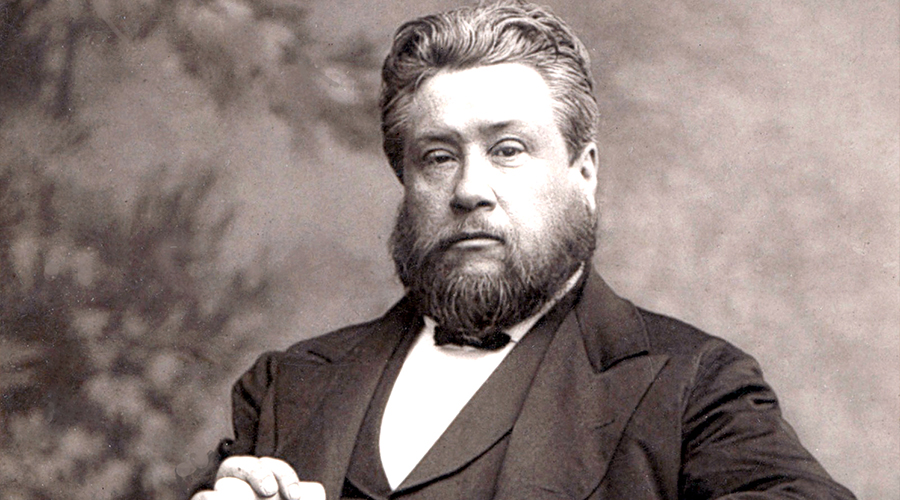
On this day in 1878, the great Baptist preacher Charles Spurgeon said in a sermon, "Such poor creatures are we that we may lose our peace of mind even by a word or a look. Peace, in the form of perfect calm and serenity, is a very delicate and sensitive thing, and needs more careful handling than a Venice glass." How quickly we can transition from a place where our soul is still, resting in the Lord, and enjoying the goodness of God to a state of emotional anxiety and frenzy.
As we return to school and the rhythms of our daily routines, we will be confronted once again with the complexities of human relationships and the brokenness of our world. Even though peace can feel elusive, the Lord promises rest to those that pursue Him. "Come to me, all who labor and are heavy laden, and I will give you rest. Take my yoke upon you, and learn from me, for I am gentle and lowly in heart, and you will find rest for your souls" (Matthew 11:28-29). There is no qualifier making this promise conditional on things outside of our own control. It does not say, "Come to me and if your boss decides to change his rotten attitude you might find some rest." The Lord will give rest to those that come to Him.
The Scriptures are keenly interested in the idea of peace evidenced by the fact that the word Peace is used more than 400 times. I'd imagine that the normal person struggles to remain in a perpetual state of peace. Even Spurgeon admits to his own struggles with depression saying, "I know what it is to suffer from terrible depression of spirit at times; yet at the very moment when it has seemed to me that life was not worth one single bronze coin, I have been perfectly peaceful with regard to all the greater things. There is a possibility of having the surface of the mind lashed into storm while yet down deep in the caverns of one's inmost consciousness all is still: this I know by experience."
In his sermon, Spurgeon elaborates on the "three rules" that Paul provides for pursuing peace in Philippians 4, "Three rules are then added by the apostle, which you will be sure to recollect. He tells us to be careful for nothing, to be prayerful for everything, and to be thankful for anything. Anyone who can keep these three rules, with the other two, will be quite sure to have a peaceful mind."
To be careful for nothing is an admonition to leave our cares and burdens with God. We are too easily burdened by things which ought not burden us. Let it go. Give it to God.
Next, Paul calls us to pray. Commune intimately with our Lord in a continual conversation. Express your cares and burdens to our faithful savior and ask that he would free you from the bondage of them. Spurgeon says so well, "A trouble prayed over is a dead lion with honey in the carcase."
Last, the apostle Paul calls us to make our requests known, "with thanksgiving." He says, "Thankfulness is the great promoter of peace; it is the mother and nurse of restfulness."
As we begin this new year, let us start well by fleeing to God.
Article Link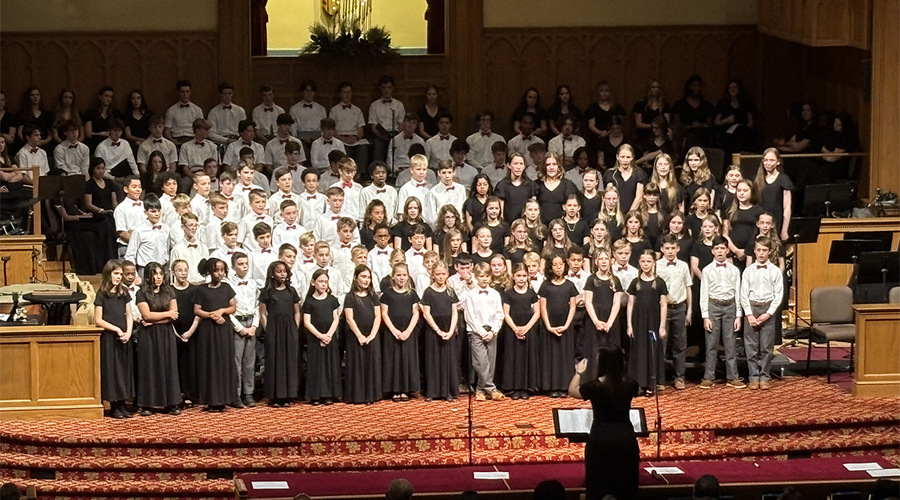
The allure of Santa Claus is certainly rooted in its superficial and festive similarities to the true Christmas story. The secular version of Christmas promises that Santa is "coming to town." The cheerful St. Nicholas will come to bless the world with gifts, joy, and peace. In his annual coming, he will spread his generosity, kindness, and laughter to the whole world. The main problem though is that Santa isn't coming to town. In 1989, my sister and I confirmed this with an elaborate system of strings connected to pots and pans surrounding the Christmas tree. The alarm bells remained silent that night. Despite the many movies that challenge us to believe the opposite, Santa did not come and is not coming.
At the end of our Christmas celebration, what kind of hope are we giving our children? A cheap hope built on the fleeting pleasures of a Santa Claus Christmas? Or are we feeding their souls with Christmas experiences centered on the story of Jesus. As Pastor Tim Keller emphasizes, "The point of Christmas is that Jesus Christ really lived, and He really died. It happened in history. He did these things. He said these things." One of the beautiful things about attending Stonehaven is partnering with a school that will reinforce a right focus for our "holy" days. At our Christmas concert, during Advent chapels and morning meetings, and in our class activities, we seek to center the minds and hearts of our children on the true story of Jesus who came to town (Luke 2:11) and will come to town again (Matthew 24:30).
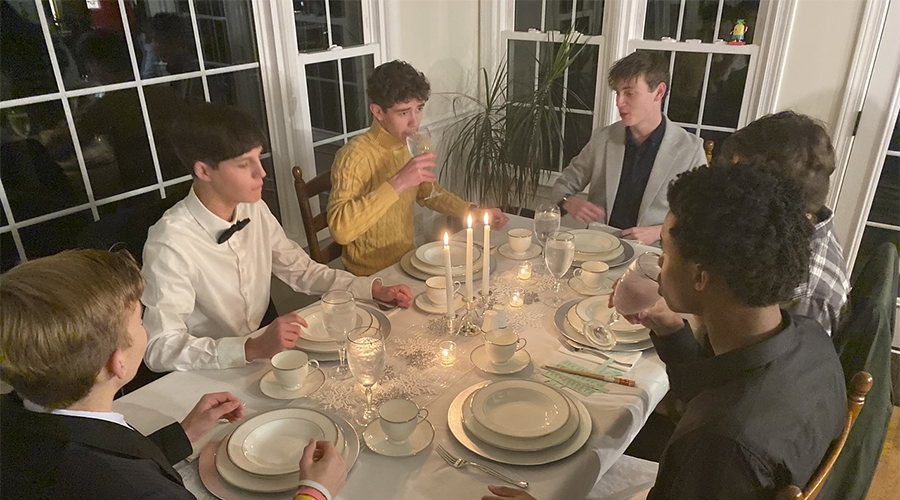
As I gaze out my office window, the world currently looks very gray and bleak. It brings to mind one of the more memorable quotes from C.S. Lewis in The Lion, The Witch, and The Wardrobe, "It is winter in Narnia and has been for ever so long... always winter, but never Christmas." When done right, the joy of Christmas morning isn't dependent on sun, snow, or comfortable temperatures. The spirit of Christmas comes from the sweet communion of our families around the dinner table or by the Christmas tree as we celebrate that Christ came to this world and will come again. One of the quickest ways to make it always winter in Marietta is to celebrate Christmas the way the world does. The world takes the superficial traditions of presents and Santa Claus and wonders why it all feels hollow in the end. How do we bring Christmas to winter? The most meaningful celebrations of Christmas integrate rich experiences and activities that can point to the ever-shining light of Christ. As parents and a school community, we invest our time and energy into intentional activities that disrupt the dreary monotony of our world. Why do we light candles, build gingerbread houses, read beautiful stories, decorate trees, wrap gifts, unwrap gifts, sing Christmas carols, and bake cookies? We do this because it brings sunshine to our world and the worlds of our children. I hope and pray that your family enjoys a winter that is for ever Christmas.
Article Link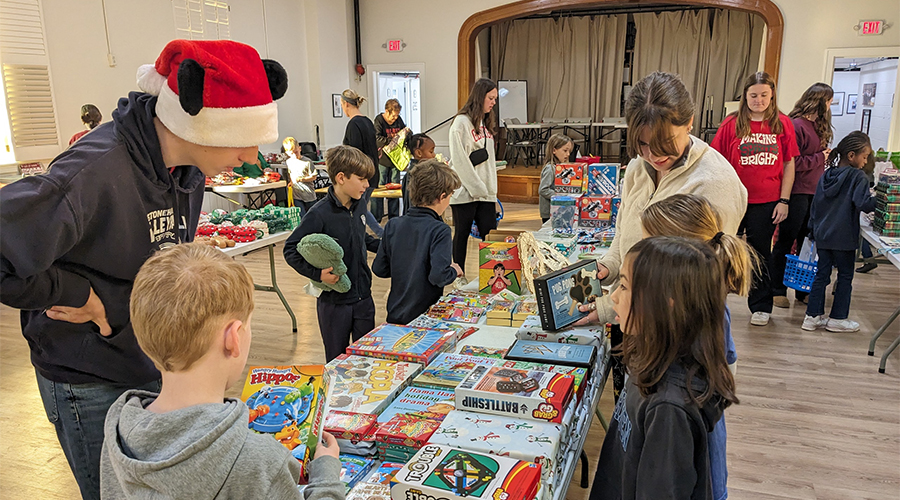
It is interesting to consider what I recall from my initial tour of Georgia Tech; the guide likely said many wonderful things about the school's stellar academic program but what I remember most were the stories related to the school's unique traditions. From the legend of the fictitious George P. Burdell (a hard-to-find member at most Atlanta churches) to the clandestine escapades to remove the T from Tech Tower, these stories captured my imagination. Undoubtedly, traditions play a crucial role in the life of an institution.
One of the beautiful things I have witnessed over the years is the development of the special Stonehaven traditions that contribute to the rich experience of our community. In any school, there are three types of traditions. There are the sacred traditions that have become essential to the culture and identity of the school. Second, we have the valuable traditions that have made a strong case to be preserved but with strategic enhancements could be made even better. With said enhancements, they might even ascend to the sacred category. Third, we have lifeless traditions that contribute little or even have an adverse impact on the culture of the school. The dead traditions need to go but are often carried on by a very small minority who refuse to let the dream die.
A Stonehaven Christmas tradition that I would place in the valuable category is our annual Christmas Bazaar. This event has been thoroughly enjoyed by our students as they learn to take the initiative in buying Christmas gifts for their loved ones. This year's version of the Bazaar, rechristened the Stonehaven Handmade Market, is an example of how to improve an already valuable tradition. Over the past two weeks, my fourth grade entrepreneur Ruby (Rubadubdub Inc.TM) has been excited and busy developing the products for her booth at the market. Her two older siblings have of their own volition provided assistance and support for Ruby's nascent handicraft business. I can only imagine that similar crafting and creating is happening in other Stonehaven households. Is this not a great way to encourage entrepreneurship and creativity in our children? Along the way, they will learn valuable lessons about sales, marketing, profit margins, competition, and maybe even failure. "Why didn't anyone buy my leaf balls?" or "I can't understand why they don't see the value in these pinecone fire starters?" Might we see future mergers or acquisitions between students? Could we take a "best of the best" to the Marietta Square Farmers Market? The possibilities are endless.
How did the Christmas Bazaar originate? What about the ideation of the Handmade Market?
Both the Bazaar and the Handmade Market were ideas from Stonehaven parents; including Tara Harvey, Connie Powell, and Karisa Hughes. Great examples of what parent partnership should look like in a school. These were not initiatives that came from the brains of administrators or even staff members. These parents approached us with these creative ideas and we partnered with them to make it a reality. Not only did these parents pass along the ideas, they have volunteered many hours of their time to managing and executing the event.
It is possible the Bazaar/Handmade Market continues into Stonehaven's future and we could visit the school in twenty years and see a hustling and bustling market that was once a small "seed" of an idea. How do such traditions begin? It starts with someone raising their hand and making a commitment to turn an idea into a reality.
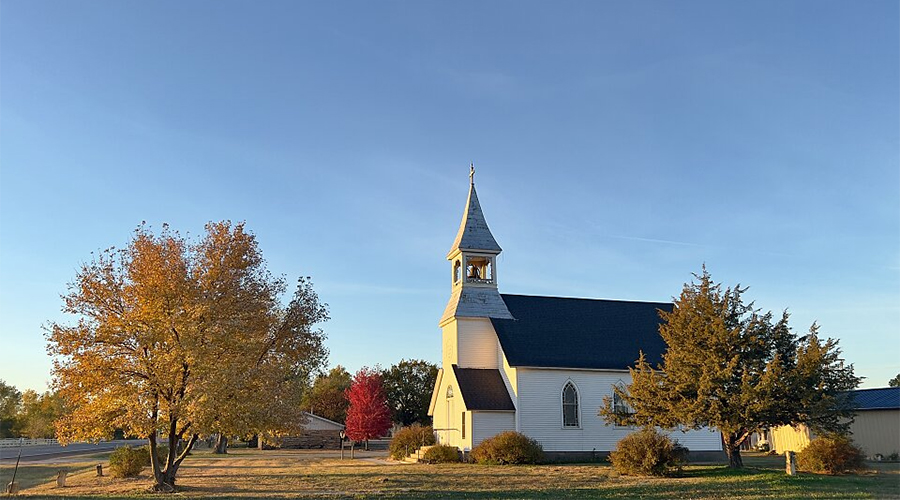
In this season of thanksgiving, Stonehaven is particularly grateful for our local churches. By my most recent count, we currently have families worshiping in at least 55 different area churches, across a wide range of different denominations and traditions. Included in this number are about a dozen area pastors who have entrusted Stonehaven with the education of their children. We are so grateful for these partnerships even as we continue to dream about ways we can strengthen these ties and bless our local churches.
One very simple but powerful way we aim to support our local churches is through prayer. In a new tradition this year, every Monday in Lower School Morning Meeting we pray for one or two of the local churches attended by Stonehaven families (this morning, for example, we prayed for Eastside Baptist Church and for their lead pastor, John Hull). By the end of the school year, we will have prayed for all of our churches and their pastors by name!
As Mr. Carrenard reminded us at the Symposium, Stonehaven is not a church, and therefore it is critically important that every family belongs to the Body of Christ in the context of a local congregation. For it is precisely in the collaborative work of church, parents, and school, all rowing in the same direction, that forms a threefold cord anchoring our children in the faith. This Thanksgiving, let us be sure to give thanks for the many faithful churches and pastors that God has placed in our communities. May God richly bless our local churches!
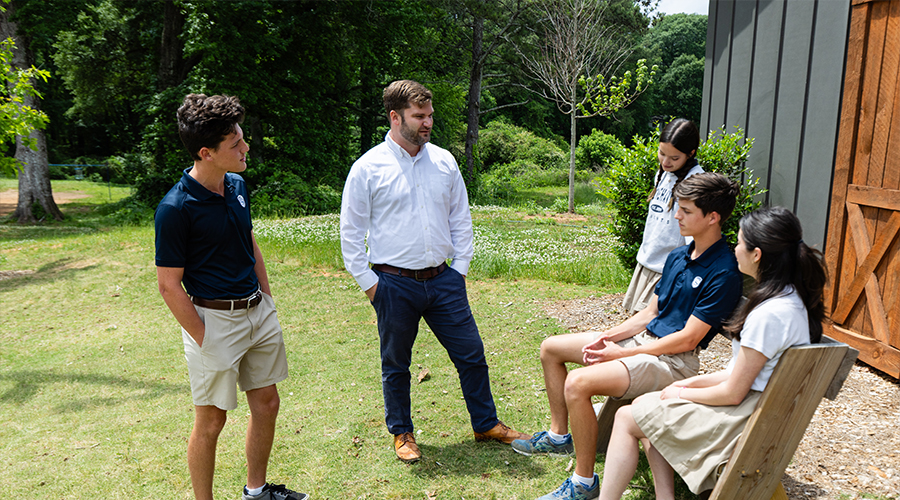
Class of 2024. Congratulations and thank you. Thank you for the multitude of ways you've invested in our school, for your patience and resilience as we've built this program, and for the years of camaraderie our community has enjoyed with you all.
As we have looked forward to this moment, an opportunity to celebrate, to look forward to your future endeavors, and to send you off, I'd like to begin by reading the final lines of George Eliot's novel Middlemarch. Speaking of the story's protagonist, Dorothea, Eliot ends with the following words, "But the effect of her being on those around her was incalculably diffusive: for the growing good of the world is partly dependent on unhistoric acts; and that things are not so ill with you and me as they might have been, is half owing to the number who lived faithfully a hidden life, and rest in unvisited tombs."
These lines both encapsulate the story's overarching themes and speak to the incredible worth of seemingly small, often unrecognized acts of goodness and faithfulness. Middlemarch, set in a small English town in the early nineteenth century, tells the story of Dorothea Brooke, a young woman of deep conviction and unbridled idealism. Dorothea grows up hoping to make a visible impact on the world, and yet her life unfolds in ways she never could not have imagined. She marries an older man and scholar, Edward Casaubon, whose work she thinks will upend the way that people think about the world. Dreaming of an intellectual partnership and grand contributions to his work, she soon finds herself nearly invisible to him, and her dreams unfulfilled.
In parallel, the novel tells the story of an ambitious young doctor named Tertius Lydgate who arrives in Middlemarch driven by a passionate idealism to revolutionize medicine and transform lives in his community. He too, finds himself disappointed - seemingly unable to accomplish what he hoped, his ambition stifled.
And yet, throughout the novel, Eliot beautifully demonstrates the ways in which these and other striving, hopeful, but often disappointed characters act in ways that shape their relationships and community in profound ways. Dorothea, Lydgate, and others come to recognize that their most powerful impact comes not in grandiose acts seen by all, but in small, everyday acts that were often hidden, and recognizable only in hindsight.
Eliot's story reminds us that the "growing good of the world" - or for us, the building of the kingdom relies on those invisible contributions and quiet faithfulness. Her story reminds me, and I hope you all, that the Lord uses all things - triumph and hardship, successes and failure, for the growing and building of his kingdom. These words are not meant to discourage you from going and doing great things, but to remind you that so many of your formative moments come from the small acts of faithfulness of you and those you surround yourselves with.
As you leave today and move on from your time at Stonehaven, my hope and prayer for you all is that you remember that your actions, regardless how small or seemingly insignificant, matter. The relationships you build, the kindness you show, the integrity with which you conduct yourselves, all these "unhistoric acts" will contribute to the betterment of your community.
To encourage you in those efforts, I have three pieces of advice to share with you: wake up, show up, and go to bed.
Wake up. First, but not foremost, I do mean that literally. You'll be more successful if you commit to a routine that recognizes the gift of waking up in the morning. But more importantly, wake up to the realities of the world around you. Recognize the yearning for connection, the brokenness, and the opportunity you have to serve others in need. Acknowledge and embrace the Lord's call on each of you to be salt and light in the places God is sending you. Actively resist the temptation to fall into self-centeredness, futility, and distraction. Know that you have a very real opportunity to contribute to the growing good of your world.
Show up. Again, part of this is literal. Go to class. Get to know your professors. Pursue excellence in your studies. Show up to church. Join the church. Be part of a church - not just as a consumer, but as an active part of the body, looking for ways to serve and care for others. You'll benefit from building relationships with people in different ages and stages. You'll be reminded that the world is bigger and the need is greater than you think. Show up for your friends. Whether it's providing a listening ear, speaking words of truth, or embodying the fruits of the spirit, your witness and your impact will be determined by the ways in which you show up for the people you love.
Go to bed. Yes, there will be times when it's right to stay up late - whether to finish a paper, or to go to that concert with friends. But as a general rule, go to bed. Rest so that you may faithfully live out your calling. Rest in the knowledge that He who is faithful and just is the one at work. You are his instruments, but the growing good of the world is not dependent on you alone. Know your limitations, trust the Lord is working in and through you and will not abandon you. Be a safe haven for those who are struggling, who need to be reminded that the Lord is gracious and compassionate. Rest in the knowledge that his mercies are new every morning and that he who began a good work in you will bring it to completion.
Wake up. Show up. Go to bed. Trust that in these small acts of faithfulness, the Lord is working to foster a community where goodness can flourish. Remember the Lord's words to his people in Jeremiah chapter 29, verses 4-7. "Thus says the LORD of hosts, the God of Israel, to all the exiles whom I have sent into exile from Jerusalem to Babylon: Build houses and live in them; plant gardens and eat their produce. Take wives and have sons and daughters; take wives for your sons, and give your daughters in marriage, that they may bear sons and daughters; multiply there, and do not decrease. But seek the welfare of the city where I have sent you into exile, and pray to the LORD on its behalf, for in its welfare you will find your welfare."
Seek the welfare of the place where God is sending you. Pray to the Lord. Serve the Lord on its behalf. In its welfare, you will find your welfare. While you may not be going into exile, you are stepping into new and unfamiliar territory. As the Israelites walked into the unfamiliar, God's call was to continue in the everyday acts of faithfulness that they were called to at home.
Cultivate your relationships with care. Be the friend who stands by others, loves deeply, and speaks truth; The family member who models gratitude, and remains faithful when things get difficult, the classmate who collaborates generously and uplifts. Your presence, your actions, your very being-these are powerful influences. Understand that these relationships are opportunities to contribute to the greater good of the world.
In the years to come, you will find yourselves facing challenges and disappointments, just as Dorothea and Lydgate did. You will encounter situations where your efforts seem unnoticed or unappreciated. In those moments, remember Eliot's words. The measure of your impact will not always be visible or immediate. Trust that the Lord is using your faithfulness in small endeavors and that it adds up, a testament to the immeasurable goodness of God.
So many of these things, on so many occasions your teachers, parents, and friends have seen you embody. I'm grateful for your witness, and we're all grateful for the ways in which you've modeled these things at Stonehaven. Know that the Lord is at work and will continue to use those small acts of faithfulness to draw others close to Him.
As you embark on a new chapter, remember that you are part of a larger story. Your actions, no matter how small, can contribute to the "growing good of the world." Live faithfully, embrace the hidden acts of goodness, and trust that your impact, though perhaps unseen, is incalculably diffusive.
Congratulations, Stonehaven Class of 2024. We love you and we're grateful for you. Go in peace.
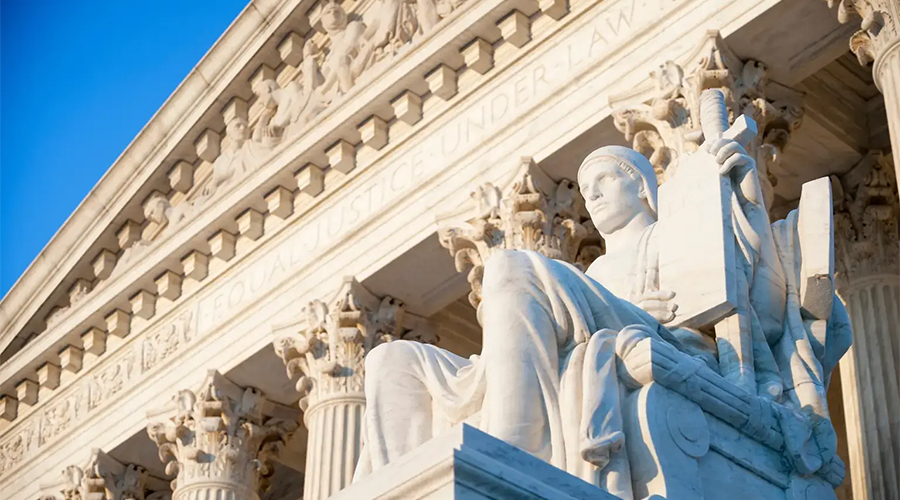
In our modern political climate, it is easy for our children to get a warped view of the place of politics. Those involved in the classical Christian school movement will often talk of the Augustinian concept of "ordo amoris." This is a Latin phrase meaning the "ordering of our affections." It refers to the principle that virtue results when our loves are properly ordered. My love for books is no longer a virtue when it exceeds my love for God. As we navigate tomorrow's political events, we are presented with a teachable moment for our children. How are they to order their political affections?
One of the books that helped me order my political passions was Nancy Pearcey's book Total Truth. She argues that "politics is downstream from culture... the most effective work is done by ordinary Christians fulfilling God's calling to reform culture within their local spheres of influence-their families, churches, schools, neighborhoods, workplaces, professional organizations, and civic institutions." I was fully persuaded that if I really wanted to impact culture, I needed to prioritize cultivating Christian virtue in my family, participating faithfully in a local church, and fervently supporting a beautiful vision of Christian education.
Too many people in our world have placed their ultimate "hope in princes" (Psalm 146:3). On both sides of the aisle. When looking for the culprit for the immorality of our secular culture, Christians are tempted to blame political turning points. If not politics, where should we point the finger?
Is it not more honest to attribute our current moral crisis to the slow spiritual decay of our families, churches, and schools? Individually and corporately, we have turned away from God. As we navigate the very important election activities tomorrow, let us make sure our children see their parents living in peace with the sovereign plan of our ever faithful God (Romans 8:28). Even if the results are not what we want, they are certainly what we deserve.
Should our Christian worldview impact our political worldview?
An argument to order appropriately our love for politics is not an argument that politics is not important... nor does it deny that a Christian worldview must inform our political worldview. Politics is vitally important to establishing a virtuous society. Our children should participate in politics. They should vote. They should run for office. They should canvas communities in support of virtuous candidates. They should debate the issues. Not all political candidates are equal.
However, as they participate in politics, they must always remember to order their affections appropriately. They should recognize that the greatest impact they can have on our culture will be through steady and mundane acts of personal faithfulness. Want to change the world? Do the next right thing. Greet your neighbor. Listen patiently to your sister. Obey your parents. Find a good wife. Raise up a family. Eat dinner together. Pursue the friend that is suffering.
As George Eliot argues in her book Middlemarch, "But the effect of her being on those around her was incalculably diffusive: for the growing good of the world is partly dependent on unhistoric acts; and that things are not so ill with you and me as they might have been, is half owing to the number who lived faithfully a hidden life, and rest in unvisited tombs." Our children can have a significant impact on this world as they live "faithfully a hidden life." As parents and teachers, our responsibility is to show them what this ordered life looks like.
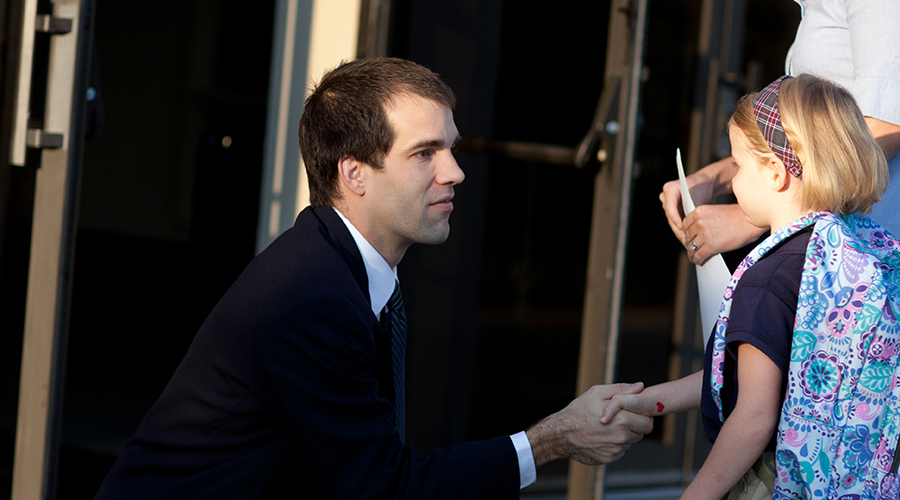
Over the month of October, Stonehaven has welcomed more than thirty prospective families through tours and Preview Days on both campuses. At the end of our Lower School Preview Day event, a guest commented that she didn't realize how in-depth the Preview Day experience would be. After watching an adorable and impressive presentation from our Kindergarten students, prospective parents hear a talk from Mr. Edwards which he has perfected over the years. Many of our parents are familiar - he opens with a story about brick masons, moves into a description of "What is Classical," (hint: Love, Grain, Tools, Tradition), mixes in a little Chesterton's fence, and concludes with a winsome description of Stonehaven's answers to "what," "how," and "why" we are doing this work. That riveting oration is followed by student ambassador and parent guided tours through classrooms and common areas on campus. Why do we go through the trouble to orchestrate such an event? Couldn't we just produce some great videos, print some brochures, and answer any questions they have? We are looking for families who are ready to partner with Stonehaven in the education of their children. We want parents who are excited by the in-depth experience at our school and ready to help cultivate a love of learning in the hearts and minds of their children.
Each time I listen to Mr. Edwards give his well-honed talk starting with the brick masons, I find a new appreciation for what I've been doing as a parent here for the last 13 years. I've been learning along with my children. I've been watching the building of a metaphorical cathedral under the guidance of amazing teachers. I've been growing in my ability to love that which is true, good, and beautiful. I may not be able to read the Aeneid in the original Latin with my senior daughter's AP Latin class or name the Cantos of Dante's Inferno with my 10th grade son, but I'm interested and engaged in what they are studying. I've watched them grow as image-bearers of God. These are the things that we hope to inspire in prospective parents as they consider their school options.
Stonehaven was a smaller community when my kids were in the grammar phase. It was easier to connect and feel known at school events. Growing larger is not a negative thing - we are following God's calling to provide a classical Christian education to more students, and it is an honor. However, it does require that parents make a more concerted effort to partner with the school, and that may look different than it did ten years ago. Our Keystone event, The Stonehaven Symposium, is coming up on November 12th. All parents are strongly encouraged to attend this event to hear from Mr. Carrenard and grow deeper in your understanding of how we cultivate truth in the hearts and minds of our students. Each of our Cultivate seminars are designed to provide thoughtful opportunities for classical enrichment for parents in a small group setting. Reading to grammar students in the library or attending a field trip or Pathfinders outing will connect you to the character formation and passion for learning that your children are receiving.
At our admissions events, we aim to give prospective parents a glimpse into the richness of the Stonehaven community. When a family is enrolled at Stonehaven, our hope is to encourage and inspire them to partake in the feast of truth, goodness, and beauty that we offer through continued partnership and a life-long love of learning with their children. I hope you have marked your calendars for November 12th - we pray that you'll be encouraged by Mr. Carrenard and enriched by the fellowship of the Stonehaven community.
